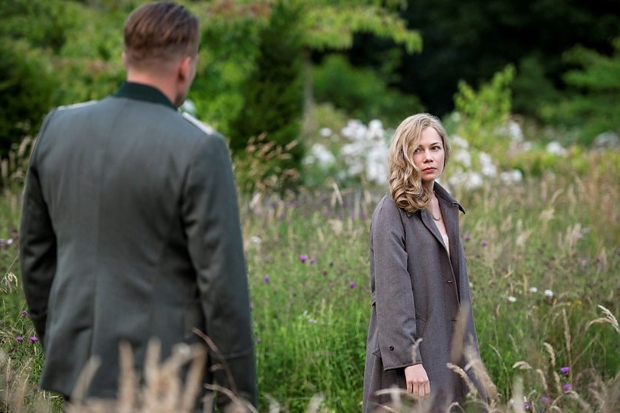Suite Française is being billed as a second world war romance about ‘forbidden love’ and, in this regard, it is handsome, solid, well played and probably fine, if you haven’t read Irène Némirovsky’s novel, but if you have? Then you may have been hoping and praying for something deeper, something more special. As you know — because I have been nothing if not repetitive down the years — I desperately try not to compare films with their source material. Let a film live or die by its own merits. But this book nags like nothing else on earth. What? Really? No! And where did that Jew in the attic come from? What is this film playing at, when it comes to Jews in attics? Can anyone put a Jew in an attic, whenever they so fancy? Could I put a few up there, this afternoon?
A bit of background: Némirovsky was a French–Ukrainian Jew who was murdered in Auschwitz in 1942 before she could complete an epic five-part portrait of life under the Nazis. She completed two of the parts — eventually published by her daughter in 2004, to international acclaim — and it’s the second part, Dolce, that is filmed here. This describes life in a French village during occupation, which is the life Némirovsky was living at the time of writing — the books are history as it was happening; that is what makes them so urgent and extraordinary — and focuses on Lucile Angellier, whose husband is a prisoner of war and who lives with her mean and domineering mother-in law. (A superb Kristin Scott Thomas, whose Madame Angellier is so cold and so white-skinned it’s as if her blood can’t even manage the warmth to circulate.)
However, their dynamic is disturbed when the Germans roll into town and they are billeted with an officer (Matthias Schoenaerts), who is refined, decent, hot (it’s Matthias Schoenaerts) and plays the piano beautifully; plays the piano dolce. Feelings develop between him and Lucile. The film takes its time in this regard, which is fair enough, although you do want to gee them up a bit. The first hour is lethargic, as is Michelle Williams, possibly through no fault of her own, as Lucile is required to do little more than mope about passively in a tea-dress. The difficulty here, in fact, is fathoming what he sees inher.
As with the book, which may, I think, be described as a sort of Cranford of its time and place, this also takes in the townspeople: the Viscount (Lambert Wilson) and Viscountess (Harriet Walter) who make nice with the Nazis, the farmer (Sam Riley) on the run, the farmer’s wife (Ruth Wilson) who must suffer the advances of their billeted German, plus Margot Robbie scampering about in skimpy dresses while looking extremely pretty (couldn’t work out who she was, character-wise, but she is extremely pretty) and a Jewish mother trying to protect herself and her daughter by pretending to be Christian. No Jews exist in Némirovsky’s Suite Française, in either book. Perhaps this character is meant to be Némirovsky herself, whose own family converted to Catholicism, not that it saved her. I don’t know. I can only think that the film-makers saw not what was actually before them, but what they felt ought to be before them, trope-wise. And what is a film about the Nazi occupation without a hounded Jew in it? As it happens, I have the answer to that. Suite Française, as written. That’s what it would be.
As directed by Saul Dibb (Bullet Boy, The Duchess), this does aim for nuance, for capturing all the moral complexities and ambivalences that must have existed, and it does show how humanity and inhumanity are evenly distributed; that there are good Nazis just as there are bad Nazis, and good townspeople just as there are bad townspeople, and sometimes good people do bad things while bad people can do good things. But, ultimately, it undoes all such work by rounding off all the storylines in a highly clichéd and simplistic way. There are invented, redemptive endings for the characters the film-makers obviously felt deserved redemptive endings — Madame Angellier is so redeemed it almost brings colour to her cheeks — and the firing squad for those it didn’t consider deserved redemptive endings. Also, there is a new explanation for the title, Suite Française, which is so sentimental and so Hollywood the voice in my head was shouting, ‘NO, NO, NO!’ but they went for it anyhow.
Does any of this matter? In the end? Might it not be enjoyed and appreciated, for what it is? I can only say that if you’ve read the book, it won’t shut up, so you must expect that, and if you haven’t, what are you doing reading this? When you could be reading that? That is the question you need to ask yourself today.






Comments